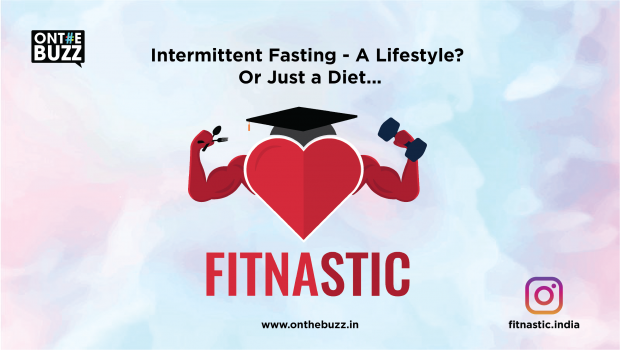What is Intermittent Fasting?
Intermittent Fasting is an eating pattern that cycles between periods of fasting and feeding. It doesn’t specify which foods you should eat but rather when you should eat. In this respect, it’s not a diet in the conventional sense but more accurately described as an eating pattern or a lifestyle. Common intermittent fasting methods involve fasting for 16 hours a day or fasting twice a week for 24 hours.
How to start Intermittent Fasting?
There are different types that follow intermittent fasting — all of them involve splitting the day or week into eating and fasting periods. During the fasting periods, you eat either very little or nothing at all.
There are two terms you need to be familiar with:
- Feeding window: It is the time of the day/week when you’re allowed to eat
- Fasting window: Basically the time when you should not be consuming any calories.
These are the most popular methods:
- The 16/8 method: The 16/8 involves skipping breakfast and restricting your daily eating period to 8 hours, such as 1–9 PM. Then you fast for 16 hours in between.
- Lean gains method: It involves fasting for 14 hours for women & 10 hours for men respectively each day & eating small meals of high protein & low carb foods in the feeding window.
- Alternate day fasting: You are allowed to consume regular meals for a day, followed by 24 hours of fasting the next day.
- Eat-Stop-Eat: This involves fasting for 24 hours, once or twice a week.For example: not eating from dinner to dinner for 24 hours.
- The 5:2 diet: With this method you consume only 500–600 calories on two non-consecutive days of the week, but eat normally for the other 5 days.
- Warrior method: Fast for at least 20 hours/day. You’re allowed to consume fruits & veggies during the feeding window. Eat only one large meal.
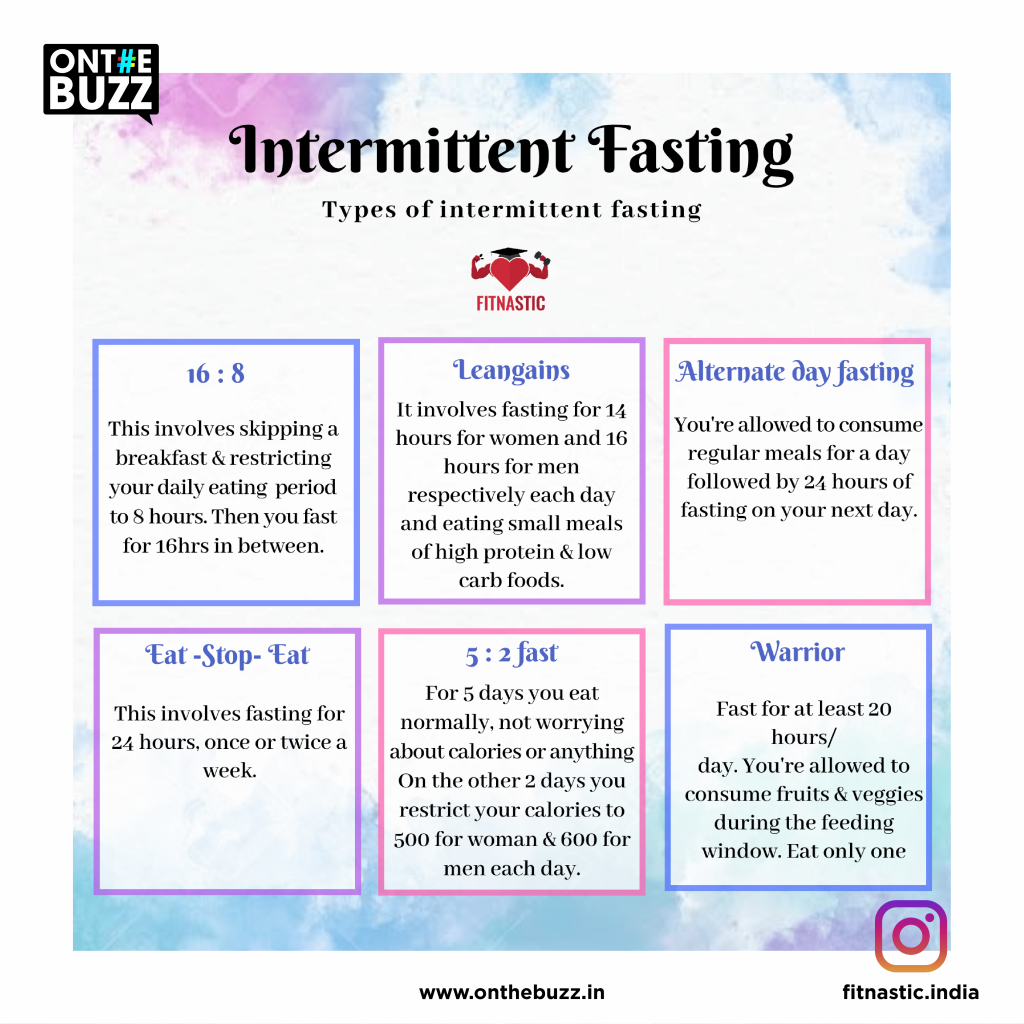
By reducing your calorie intake, all of these methods should cause weight loss as long as you don’t compensate by eating too much during the eating periods.
Note: 16/8 method is the popular routine for beginners. Many people find the 16/8 method to be the simplest, most sustainable and easiest to stick to.
The benefits of Intermittent Fasting:
Studies have shown that intermittent fasting can have powerful benefits for weight control and the health of your body and brain. It may even help you live longer.
Here are the health benefits of Intermittent Fasting:
- Weight loss: Helps you lose weight and belly fat, without having to consciously restrict calories.
- Insulin resistance: Reduces insulin resistance, lowering blood sugar by 3–6% and fasting insulin levels by 20–31%, which should protect against type 2 diabetes.
- Inflammation: Some studies show reductions in markers of inflammation, a key driver of many chronic diseases.
- Cardiac health: The term cardiac health means ‘health of your heart’. Intermittent fasting can effectively reduce LDL (bad) cholesterol, blood triglycerides, inflammatory markers, blood sugar and insulin resistance — all of the above are major risk factors for heart diseases.
- Cancer: Animal studies suggest that intermittent fasting may prevent chances of cancer.
- Brain health: Increases the brain hormone BDNF and may aid the growth of new nerve cells. It may also protect you against Alzheimer’s disease.
- Anti-aging: Can extend lifespan in rats. Studies have shown that fasted rats lived 36–83% longer.
- Reduce stress: May lead to reduction in oxidative stress.
- Induces Autophagy: Consumption of the body’s own tissue for the metabolic process occurring in starvation and certain diseases is known as autophagy which leads to weight loss.
- Cellular repair: Intermittent fasting state speeds up the degradation and recycling of cellular waste.
- Strong immune system: Improves the immunity of our body and makes it strong to fight against various diseases & injuries.
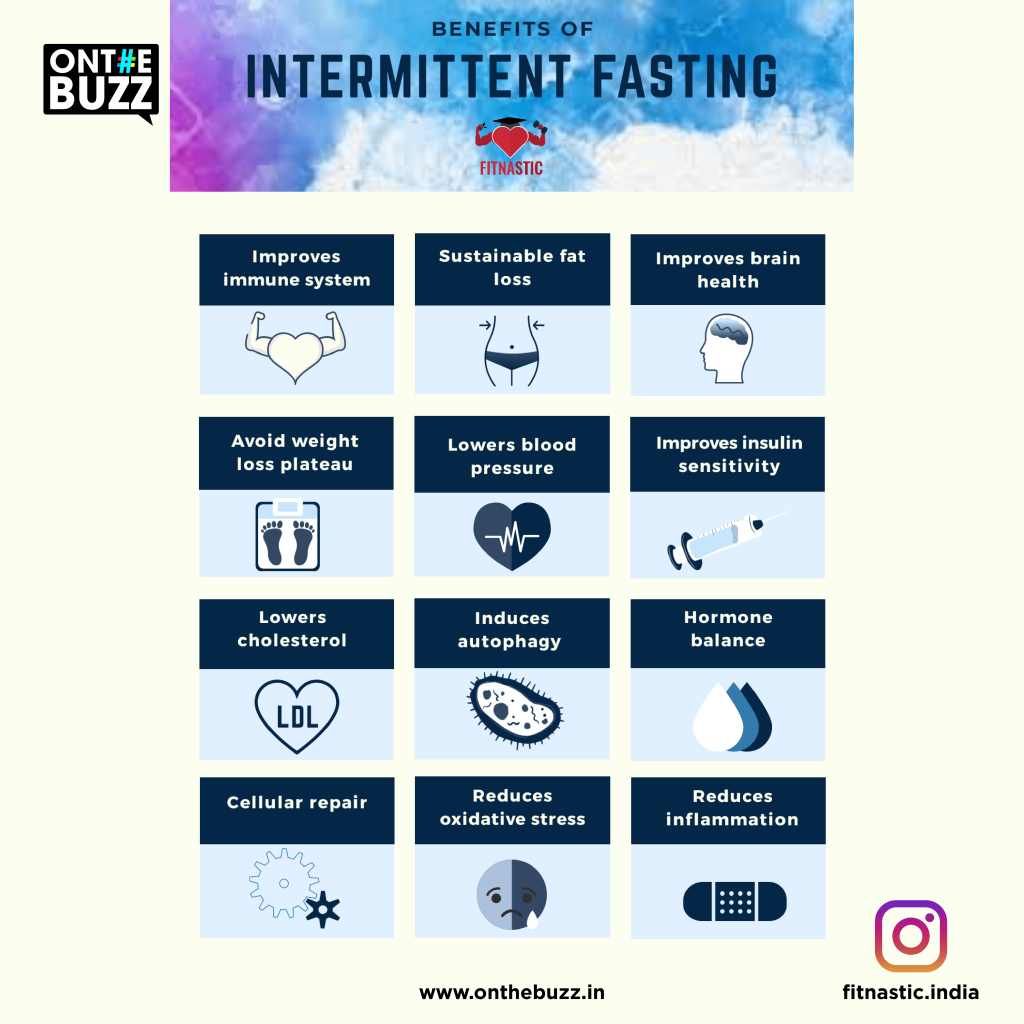
Top foods to eat during intermittent fasting:
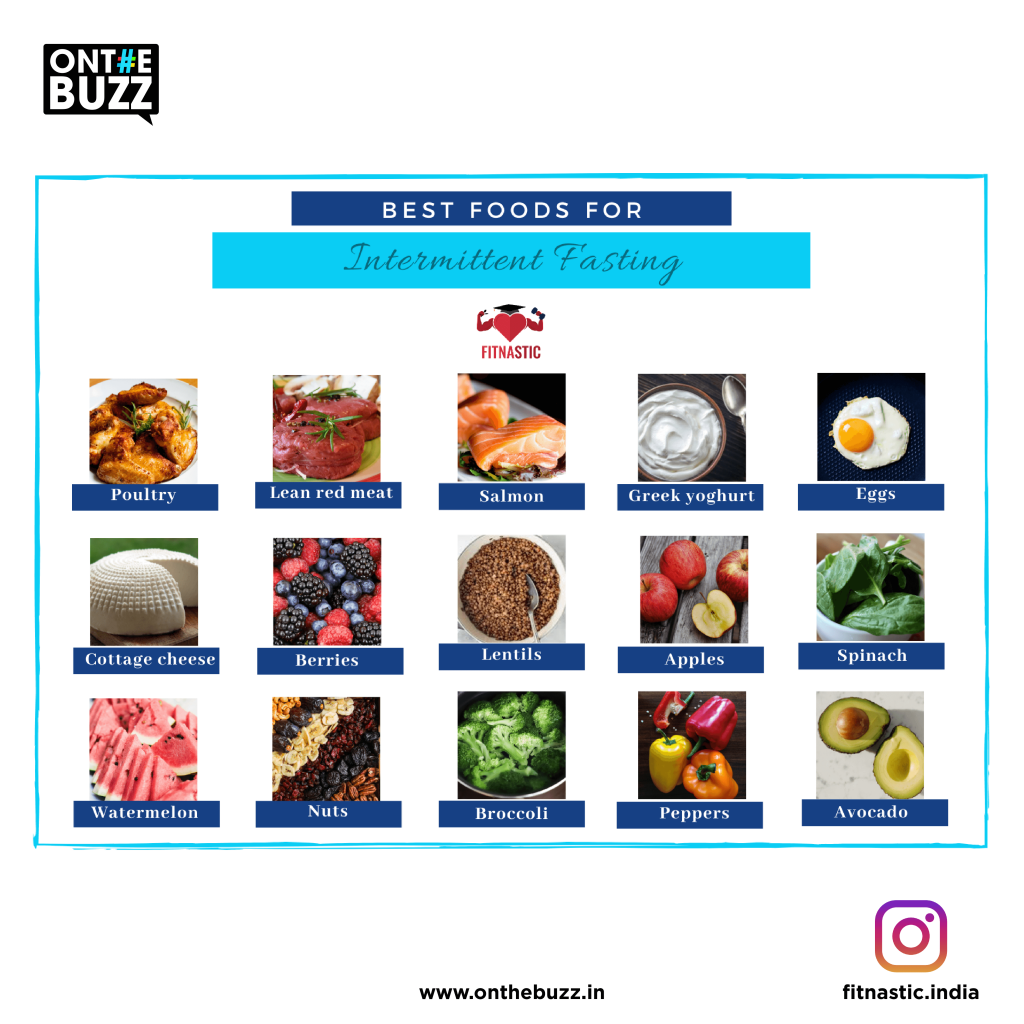
Types of food not to be eaten while on the Intermittent fast:
- Processed meat & fried foods.
- Refined sugar & refined flour
- Trans-fat & refined starch
Top drinks to cut belly fat while fasting:
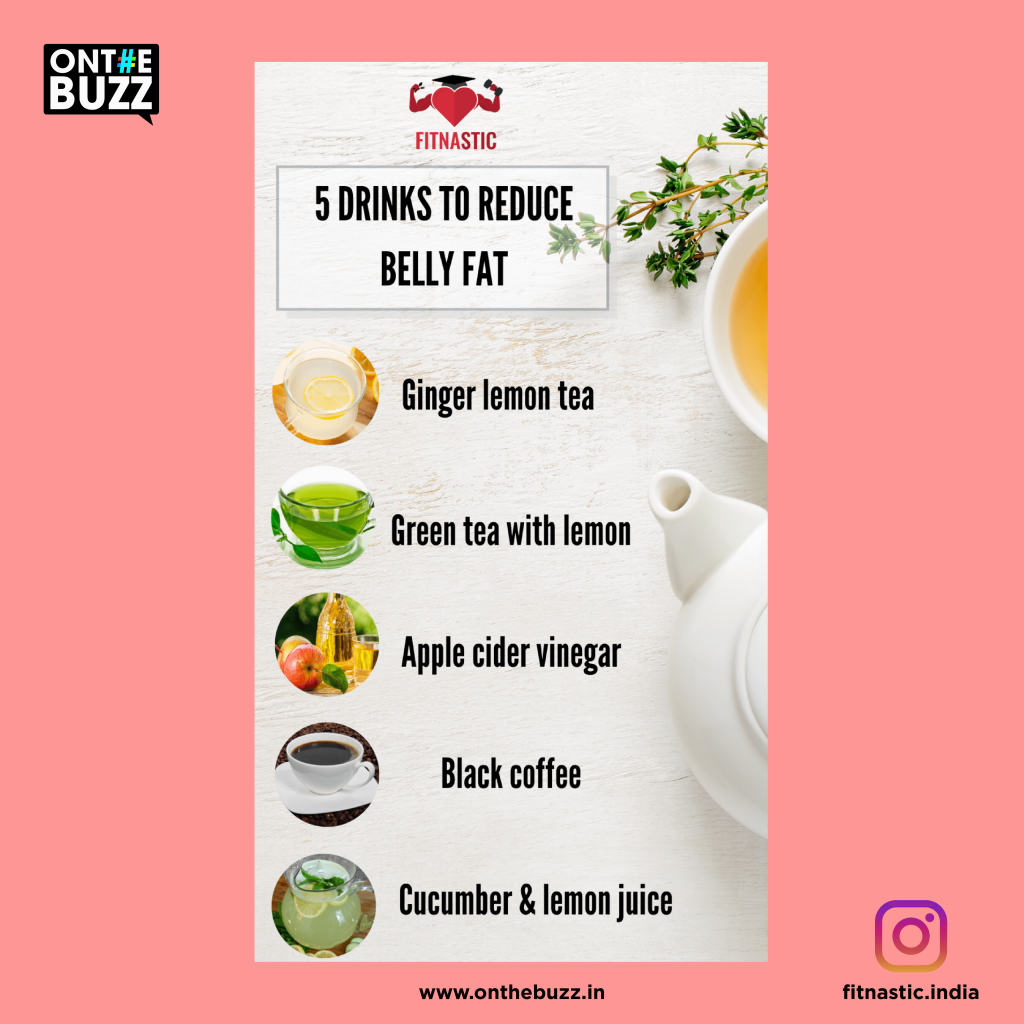
Sample daily schedule for Intermittent Fasting:
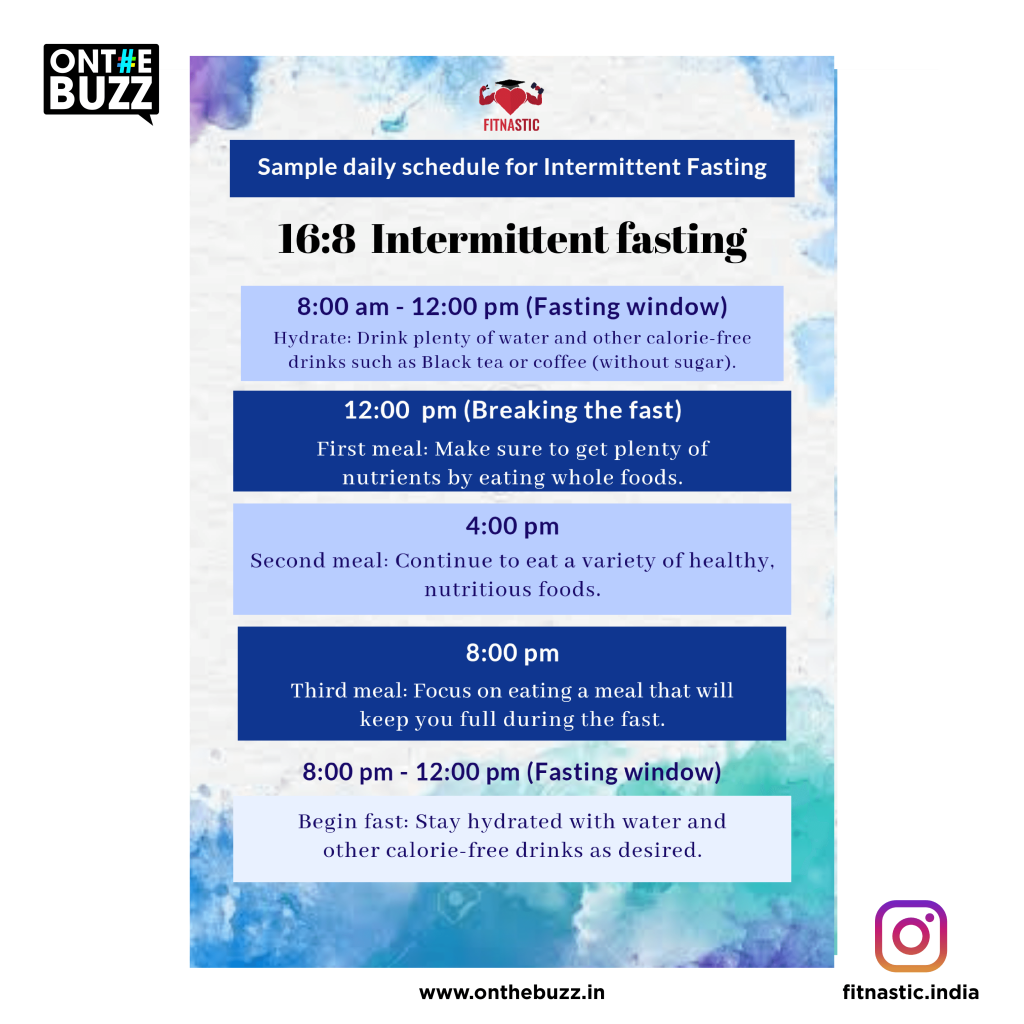
Safety guidelines for Intermittent Fasting:
- If you have any medical condition, you should consult with your doctor before you try intermittent fasting.
- Those with fertility issues and/or are trying to conceive, avoid intermittent fasting. This eating pattern is strictly unadvisable if you’re pregnant or breastfeeding.
- Women with a history of amenorrhea. (It is the absence of menstruation one or more missed menstrual periods. Women who have missed at least three menstrual periods in a row have amenorrhea) should avoid intermittent fasting.
- This eating pattern is not advisable if you’re underweight or under certain prescribed medication for any chronic medical conditions.
Tips and Tricks to follow Intermittent Fasting:
- Exercise: Although exercise is not absolutely necessary to lose weight while you follow Intermittent Fasting but it definitely fastens the process & makes it more effective.
- Drink Water: Staying hydrated is never a bad idea to curb hunger pangs and keep cravings at bay.
- Track your progress: Track your intermittent fasting, start from the beginning till the end.
- Black coffee: Consume black coffee (Without sugar or honey) in the morning to stay in a fasted state & helps to curb your appetite.
- Try the salt trick: Hungry? Pour a little salt on your wrist and lick it off. This works to curb your appetite.
- Stick to a schedule: It’s advisable to be as consistent as possible with your meal timings and fasting schedule.
Why Intermittent Fasting?
- Weight loss is the most common reason why people follow intermittent fasting. By making you eat fewer meals, intermittent fasting leads to a reduction in caloric intake. Additionally, Intermittent Fasting changes hormone levels to facilitate weight loss.
- In addition to lowering insulin levels and increasing growth hormone, it increases the release of the fat burning hormone nor-epinephrine (nor-adrenaline). It causes major changes in your hormones, short-term fasting may increase your metabolic rate by 3.6–14%. Basically intermittent fasting is one of the most powerful routines to lose weight.
Story contributed by Rishi Nagar (Founder, Fitnastic).
About Fitnastic: Fitnastic was founded in January, 2020 with the aim to help individuals go through their fitness obstacles and transform them into a stronger, fitter and confident individual. Rishi Nagar being the founder and Ojas Bhatt being the Co-Founder, they believe in the ideology that exercise and nutrition are the utmost priority for healthy well-being.
At Fitnastic, they craft an individual’s well-being by not only providing customized diet plans and live training/training routines, but also provide conversations with doctors on various health issues, easy-to-make healthy recipes & also educate people by providing scientific knowledge about different dieting patterns, herbs, and physiological functions of the human system.
Because, Fitness is not a joke!
Follow Fitnastic for more updates on Health and Fitness:
Website: www.fitnasticindia.com
Instagram: Fitnastic.india
Facebook: Fitnastic.fitindia
LinkedIn: Fitnastic (Company)
Contact: +91-8209512559 / queries@fitnasticindia.com

